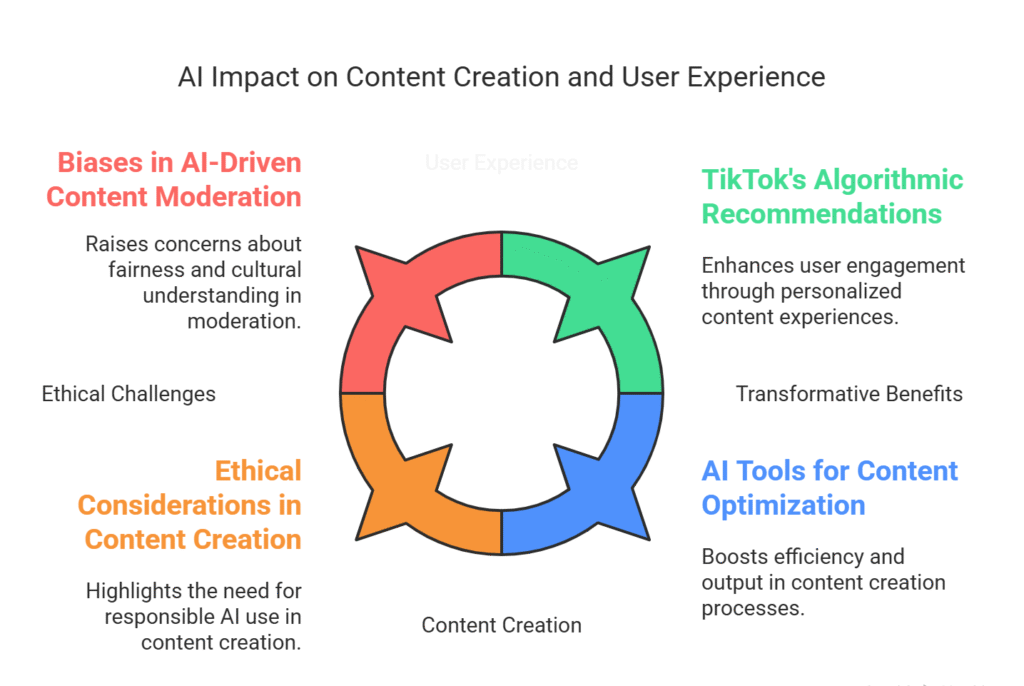The digital landscape is undergoing a seismic shift, and the architect of this change is Artificial Intelligence. From the articles we read to the products we buy, AI is silently and profoundly reshaping how content is created, curated, and consumed. This technological revolution promises a future of unprecedented efficiency and personalization in content strategy. Yet, beneath this glossy veneer of progress lies a complex and often troubling terrain of ethical dilemmas, particularly in the realm of content moderation. As we hurtle towards an AI-driven future, a critical question emerges: How do we harness the immense power of AI in content without sacrificing our values?
This article delves into the multifaceted impact of Artificial Intelligence on the world of content. We will explore how AI is empowering creators and marketers to produce highly optimized and engaging material at an unprecedented scale. We will then navigate the murky waters of AI-powered content moderation, examining the inherent biases and the profound implications for free speech and global discourse. Finally, we will look at how AI is personalizing our digital experiences, for better or for worse, and what the future holds for this transformative technology.
The Creator’s New Superpower: AI in Content Generation and Optimization
For content creators and marketing professionals, AI has emerged as an indispensable ally. A suite of powerful AI tools, such as ChatGPT, Jasper, and Semrush, has automated and augmented various stages of the content lifecycle, leading to a significant boost in productivity and effectiveness. The drudgery of brainstorming topic ideas, a task that once consumed hours, can now be accomplished in minutes with the help of AI-powered suggestion engines that analyze trending topics and user search intent.

Beyond ideation, AI is proving to be a game-changer in the actual creation of content. While the dream of a fully autonomous AI author churning out flawless long-form articles remains a work in progress, AI writing assistants can generate outlines, draft sections of text, and even help in crafting compelling marketing copy. This allows human writers to focus on higher-level tasks such as strategic thinking, storytelling, and injecting genuine creativity and emotion into their work – qualities that, for now, remain distinctly human.
Furthermore, the impact of AI on Search Engine Optimization (SEO) cannot be overstated. AI-powered tools can analyze vast amounts of data to identify relevant keywords, suggest improvements for readability, and uncover valuable internal and external linking opportunities. This data-driven approach to content optimization helps businesses to rank higher in search engine results, driving organic traffic and increasing brand visibility. The ability to analyze competitor strategies and identify content gaps in real-time provides a significant competitive advantage in the crowded digital marketplace. For instance, a business can use AI to determine that their competitors are not adequately addressing a specific customer pain point and quickly create content to fill that void.
The benefits extend to content curation as well. AI algorithms can sift through the deluge of online information to identify the most relevant and high-quality content for a specific audience. This allows brands to position themselves as thought leaders by consistently sharing valuable insights and resources. By automating the time-consuming process of content discovery, AI frees up marketers to focus on building relationships with their audience and fostering a sense of community.
The Moderator’s Dilemma: Navigating Bias and Censorship in the Age of AI
While the creative applications of AI are largely celebrated, its role in content moderation presents a far more complex and ethically fraught picture. Social media giants like Meta (formerly Facebook) and Instagram rely heavily on AI algorithms to police their platforms, flagging and removing content that violates their community standards. On the surface, this seems like a necessary and efficient solution to the overwhelming volume of user-generated content, which includes everything from hate speech and misinformation to graphic violence.

However, the reality is far from straightforward. AI-driven content moderation systems are trained on vast datasets of existing content, which inevitably reflect the biases present in society. This can lead to the disproportionate censorship of marginalized communities and dissenting voices. For example, algorithms have been shown to be less effective at understanding and interpreting dialects and cultural nuances prevalent in the Global South, leading to the wrongful removal of legitimate content and the stifling of important conversations.
The reliance on automation also raises fundamental questions about free speech. The opaque nature of these algorithms often leaves users with little recourse when their content is removed without a clear and justifiable reason. This lack of transparency can create a chilling effect, where users self-censor out of fear of their content being arbitrarily flagged. The very definition of what constitutes “harmful” content can be subjective and culturally dependent, and entrusting these nuanced decisions to machines can have far-reaching consequences for public discourse.
Furthermore, the human cost of AI-powered moderation cannot be ignored. While AI handles the initial filtering, human moderators are often tasked with reviewing the most disturbing and graphic content that the algorithms flag. This relentless exposure to traumatic material can have severe psychological consequences, leading to burnout, anxiety, and other mental health issues. The ethical responsibility of tech companies to protect the well-being of these “digital janitors” is a critical aspect of the AI ethics debate.
The Personalized Future: AI and the Customer Experience
Beyond content creation and moderation, AI is playing a pivotal role in personalizing the customer experience. By analyzing user data, including Browse history, purchase behavior, and social media interactions, AI algorithms can deliver highly tailored content and recommendations. This is perhaps most famously exemplified by TikTok, whose powerful recommendation engine has captivated a global audience by serving up an endless stream of videos perfectly aligned with each user’s interests.
This level of personalization can significantly enhance user engagement and satisfaction. When customers feel that a brand understands their individual needs and preferences, they are more likely to develop a sense of loyalty and connection. From personalized product recommendations on e-commerce sites to customized news feeds on social media platforms, AI is creating a more relevant and engaging digital world.
However, the drive for personalization also has a dark side. The creation of “filter bubbles” and “echo chambers” is a significant concern. When users are only exposed to content that confirms their existing beliefs, it can lead to increased polarization and a diminished capacity for critical thinking. The potential for manipulation is also a serious ethical consideration. As AI becomes more adept at understanding and influencing human behavior, the line between helpful personalization and intrusive persuasion can become dangerously blurred.
In conclusion, the integration of Artificial Intelligence into the fabric of content creation, curation, and consumption is a double-edged sword. On one hand, it offers unprecedented opportunities for efficiency, creativity, and personalization. On the other, it presents a host of complex ethical challenges that demand our careful consideration. As we continue to develop and deploy these powerful technologies, it is imperative that we prioritize transparency, fairness, and human oversight. The future of content, and indeed the future of our digital society, may well depend on our ability to strike this delicate balance. The goal should not be to replace human ingenuity and judgment with artificial intelligence, but rather to augment and empower it in a way that serves humanity as a whole.



